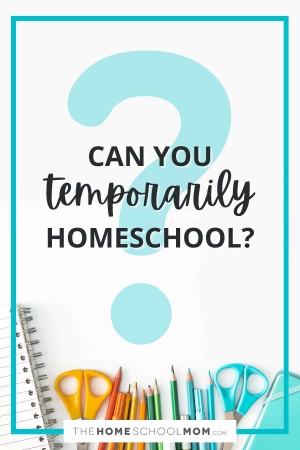Are you considering temporarily homeschooling?
Some people know they will homeschool before their children are born. Some begin homeschooling after their children spend some time in school, but then they decide to homeschool "forever"-or at least, for years. Others decide to take it "a year at a time," but the implication is that if it works out, homeschooling will be ongoing.
And then there are short-term homeschoolers: people who homeschool for a summer, a semester, or a year, knowing their children will return to school. Many of them consider themselves accidental homeschoolers.

Can I homeschool my child temporarily?
Yes, you can homeschool temporarily. If you are considering short-term homeschooling, you can know that other families are also homeschooling for a specific duration, although their reasons may be different.
You can homeschool for a summer, a semester, a year, or even for a few years knowing that it will only be temporary. Many people meet their children's educational needs with an interlude of planned homeschooling even though their children will spend most of their years attending public or private school.
What are some reasons for temporary homeschooling?
- Negative school situation. Parents often want to do short term homeschooling in order to get their children out of a negative school situation that has shown no promise of improvement, despite concerted efforts on the part of parent and child. This can include homeschooling because of bullying by other children, humiliation by a poor teacher, a dangerous atmosphere, poor grade placement, exceedingly long bus rides, or failure of a school to carry out IEPs for children who have special needs. In other words, it's situational, and parents want to do something else because the current situation is untenable.
- School refusal. Some kids are so uncomfortable with school attendance that they refuse to attend. Homeschooling may be seen as a short-term measure that can continue a child's education even as the parent hopes that the child will be willing to attend school in the future.
- Academic remediation. Homeschooling is efficient and effective. Some families want to homeschool only because their child is considered behind by school standards in specific academic skills or knowledge, and they feel extra time working one-on-one with a parent or tutor will provide the academic boost that is needed. Their plan is to re-enroll their child in school when she or he has "caught up." Many people who are homeschooling for remediation will take it on as "summer schooling" if not for a full semester or year. If you are interested in homeschooling to remediate academic problems, you will want to read about homeschooling the child who is behind in school.
- Special needs. Some families may homeschool when their child's special needs are not being met through a specific school. These parents should consider whether their child is being encouraged to homeschool and pushed out by their school. However, sometimes bypassing a particular school that has been more uncooperative or has fewer resources may be an overall benefit, even if the child will be re-enrolled when she or he ages into a different school. Homeschooling children who have been labeled as having ADD or ADHD may give those kids an environment that is more conducive to their learning style.
- Parent's health. When a parent has a serious health problem or terminal illness, maximizing a child's time with the parent may make a lot of sense. That parent may not be able to be the one who is "in charge of" the child's homeschooling, but a family may benefit from time spent together during a special few months or an uncertain year. Of course, the adults need to consider the child's desires and ability to be in a situation that may feature frequent crises, suffering, and hard times. Still, there may be no substitute for having generous time to love one another when time is not going to be so generous in the long run.
- Child's physical health. Homeschooling children who have chronic illnesses or serious injuries can make a lot of sense. While public schools do offer homebound instruction, some families find it inflexible and unrealistic, or not enough resources are provided because of a school's financial limitations. Some families simply switch to homeschooling while their children heal or recover strength. Homebound and homeschooling are distinct and are governed by separate laws; if you plan to homeschool a child for health reasons who was previously receiving homebound instruction, in most states you cannot simply "unofficially slide" from one to the other. You should learn your state's laws for homeschooling.
- Child's emotional and mental health. This has been alluded to earlier -- a child who is bullied at school or who is refusing to attend school may have emotional challenges that will be helped by getting them out of the school situation. However, there are also other mental health challenges, such as depression, anxiety, and other conditions which may be difficult to treat when a child is in school. Homeschooling allows a family to prioritize emotional health, even over academic achievement.
- Reconnection. Related to emotional health, some parents find their children in school are drifting away from valuing family relationships. They spend a lot of time with peers and adults who are not part of the family, and they are busy with friends, homework, or activities -- some of which may be positive and some of which may be negative. Parents want an opportunity for their kids to reconnect through generous family time.
- Behavior problems. Related to the need to reconnect, emotional health, and possible peer dependence, some parents want to address a child's negative behavior that has been occurring in school. It can be difficult for parents to know the full situation around behavior problems they can't see. Having a child at home can provide valuable information about the root of behavior issues, as well as time to help a child learn to manage. Some parents see that schools are dealing with many children and may take an adversarial role with kids who do not behave as expected. At home, parents may choose to be allies with their children in helping them learn more positive behavior. Some children benefit from extra time to work with therapists or be in an environment that is less stressful and more likely to reinforce positive behavior.
- A break. Some parents simply feel that their kids will benefit from a break from regular school. They want their children to have an opportunity to get away from school requirements and constraints, so they can experience a more relaxed schedule or learning dedicated to their own interests. Parents might sense their child is losing touch with authentic interests or burning out from having nose-to-the-grindstone. They want their child to take a leave of absence and return to school refreshed after a long break, with renewed curiosity.
- Unique opportunity. Sometimes a special opportunity comes along that school simply cannot accommodate. Perhaps your family is going to travel cross country in an RV. Perhaps a special mentor is going to become available in your child's special area of interest. Maybe there is a life or learning opportunity that a parent wants to create-or that a child is seeking-that will be unique and valuable. Learning within the family often fits these opportunities far better than attending the same brick and mortar school on the same schedule each day, week, and month. Homeschooling can flex around these opportunities.
- Frequent moves. Military families and others who know they will experience multiple short-term moves sometimes choose to homeschool during the period when they expect the most transitions. While they intend for their children to attend school in the future, they believe their children will do better with the consistency of homeschooling through the physical moves, rather than starting over at multiple schools within several years. Read more in my article about homeschooling and moving.
- Natural disaster. Schools are not immune to hurricanes and fires. While communities often try to rally quickly to hold classes in alternative locations when schools are damaged or destroyed, some parents prefer to keep their children home until a new school setting becomes permanent. They want to spare the child the numerous transitions or help deal with a child's anxiety about the hurricane, earthquake, flood, or fire.
Some of these reasons for short-term homeschooling may be born of desperation; others may be born of optimism.
For some, homeschooling short-term is a decision of last resort-parents do not see another option that is positive for their child, and they are anxious to have him or her back in school as soon as possible. For others, homeschooling is seen as something they'd love to continue to do, but financial obligations or other scenarios block consideration of longer-term homeschooling.
What are the logistics of temporary homeschooling?
It is legal in every state to start homeschooling at any time during the year. Regulations for home education are set by the state government and vary from state to state.
Requirements range from none at all in permissive states to stricter requirements in more regulated states, including applying for permission, registration/notification of homeschooling, taking attendance, providing proof of progress from a standardized test or evaluation, and more. The administration in your local school district (usually the superintendents are the responsible parties) is typically charged with the implementation of the state requirements.
We recommend following the guidance of your state homeschool organization with regard to legal compliance as they are usually the most familiar with both the homeschool laws and way they are implemented locally.
Some of the things you will want to consider are what your daily schedule will look like, what homeschool curriculum or resources you will use, and how to keep track of your records throughout the school year. Organization looks different for each family; our ultimate guide to homeschool organization has lots of ideas to help.
Is temporary homeschooling the same as homeschooling for the long haul?
Although it may appear that homeschooling is homeschooling, the reality is quite a bit different. Parents should be aware of the limitations of short-term homeschooling, even as their children may also reap some potential benefits.
Families that are homeschooling temporarily often forego the most significant benefits of homeschooling because they want or need the safety net of keeping their child ready to reenter school. In order to facilitate a smooth transition back to school, parents may end up replicating traditional school methods at home or enrolling in an online school instead of embracing the freedom to choose from a variety of homeschooling styles or approaches.
Parents holding onto a "return to school" safety net are less likely to take advantage of things like:
- Helping their child with contextual learning or pursuing passions.
- Following interest-led learning, which leads to developing skills and knowledge across all academic areas.
- Downplaying weaknesses in ways that can make a child gain confidence through strengths-based learning.
- Building inquiry-based learning into their days, helping kids grow their critical thinking, which is a huge benefit of homeschooling.
- Recognizing their own expertise on what their children need.
The long-term commitment to homeschooling allows parents to let go of school-based expectations and fully embrace the benefits of homeschooling in ways that take advantage of the uniqueness of homeschool freedom.
Read about what to keep in mind if you are considering homeschooling for the long haul.
And remember, even though you may be unlikely to do all the things a longer-term homeschooler might do, meeting your child's needs by homeschooling temporarily is a true gift to your child. We call this homeschooling's Power of Now, which happens when you take action to help your child thrive today.
What about returning to school?
For a full overview of what you may encounter upon re-enrollment in public school, read When Your Child Goes from Homeschooling to Public School. If you have a high school student, be aware that there are special considerations when transferring homeschool credits to public school.
Don't misunderstand what your local school means when they say that your child can return to public high school. Parents of teens taking courses for high school credit need to be aware that while public high schools do have to let teens enroll after homeschooling, they do not have to accept credit for high school work done at home.
The difference between agreeing to enroll a student and agreeing to accept credit for work done is significant, and many parents have been caught off-guard thinking that the promise of re-enrollment was the same as the promise of accepting credit. If you find yourself in that position, know that you have options.
We strongly recommend that the choice to homeschool high school be a commitment for all of the high school years. From creating homeschool transcripts to what to do when mom's not an expert on the subject matter, we have resources to smooth your path all the way through issuing a high school diploma and graduation.
The bottom line is that school is in charge of school. You may find your school accommodating, but ultimately the decisions are up to the school administration.
Some short-term homeschoolers I have met during my twenty years of homeschooling have ended up homeschooling a little longer than expected! You never know.




 A popular speaker at homeschooling conferences, business groups, and parents’ groups, Jeanne Potts Faulconer homeschooled her three sons in North Carolina, Mississippi, and Virginia for twenty years. Holding her Master of Arts degree in Communication, Jeanne conducted portfolio evaluations for Virginia homeschoolers for evidence of progress for many years. Jeanne is a former college faculty member, former editor for several publications, news correspondent for WCVE, and former director of Brave Learner Home. She is the contributing editor for TheHomeSchoolMom newsletter and writes the popular Ask Jeanne column addressing homeschool parents' questions here at TheHomeSchoolMom.
A popular speaker at homeschooling conferences, business groups, and parents’ groups, Jeanne Potts Faulconer homeschooled her three sons in North Carolina, Mississippi, and Virginia for twenty years. Holding her Master of Arts degree in Communication, Jeanne conducted portfolio evaluations for Virginia homeschoolers for evidence of progress for many years. Jeanne is a former college faculty member, former editor for several publications, news correspondent for WCVE, and former director of Brave Learner Home. She is the contributing editor for TheHomeSchoolMom newsletter and writes the popular Ask Jeanne column addressing homeschool parents' questions here at TheHomeSchoolMom.
I need to homeschool my child for 8th grade only. He will be going back to regular school for high school. I have signed him up for the I-DEA program but I am looking for a mom who is willing to take on an eighth grader along with her own child/children. Is there a site out there that moms post things like this on?
Hi Anne - Sorry I missed this earlier. I would get in touch with local homeschoolers in your area either through social media (Facebook has tons of homeschool groups by locality) or in person groups (you can look on TheHomeSchoolMom for a local homeschooling group). Many local areas have message boards, email groups, and social media groups that would be a good place to ask, and of course you should look into whether your state allows a parent to homeschool children other than their own. Good luck this year!